
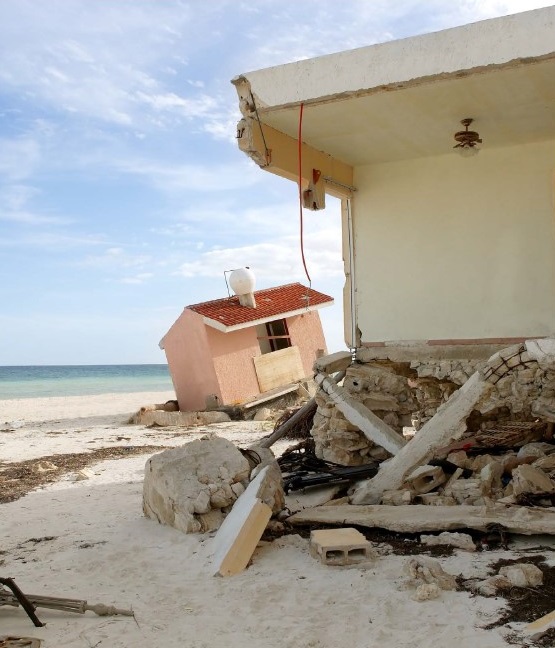
Hurricane Irma and Caribbean tourism: A Special Meeting at the UNWTO GA
Initiated by Jamaica’s minister of Tourism Edward Bartlett, a Special Meeting was organized on the occasion of the UNWTO’s 22nd General Assembly in to discuss how to support the destinations affected by Hurricane Irma and the earthquake that struck the southern coast of Mexico.
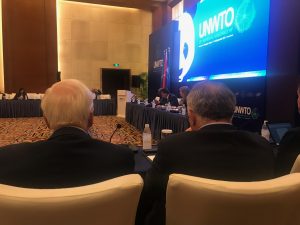
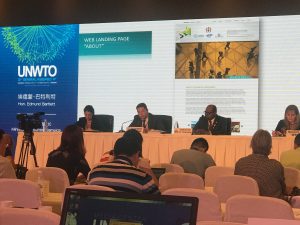
Combining a press conference discussing the upcoming sustainable tourism conference in Jamaica and expanding the subject to address the recent Hurricane Disaster in many Caribbean countries, representatives from all over the Caribbean including the U.S., Netherlands, France, and Spain met to discuss a next step.
The impact of these natural disasters on infrastructure and natural resources has been significant. Tourism is the main pillar of the economies and lifeline of Caribbean destinations. The meeting identified three lines of action:
• Supporting the recovery of the affected destinations through the private sector and aid agencies. IT was noted that special attention should be given to SMEs due to their lack of means to rebuild and recover.
• Sharing experiences on resilience and crisis management.
• Developing strong and coordinated communication.
The group also agreed to propose that the General Assembly to adopt a special resolution expressing solidarity and support to the affected destinations and calling for the support of the international community.
The UNWTO Secretary-General will convey the concerns and needs of the tourism sector in the region to the coming meeting of the UN Chief Executive Board which gathers the heads of the UN system.
A working group was created to follow up on the meeting’s discussions in close coordination with the Caribbean Tourism Organization (CTO), and the recovery of affected destinations will take center stage at the UNWTO/Government of Jamaica/ World Bank Conference taking place in Jamaica later this year.
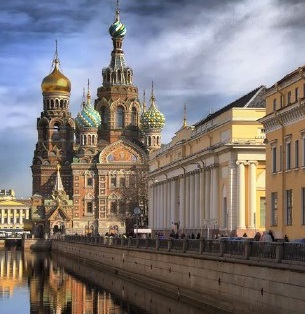
UNWTO General Assembly: See you in St. Petersburg in 2019!
Saint Petersburg in Russia has been selected to be the host of the 23rd session of the UNWTO General Assembly in 2019. The selection was made at the 22nd session, currently being conducted in Chengdu, China.
Widely admired for its majestic architecture, cultural richness and historical significance, Saint Petersburg includes treasures within the art collections of the Hermitage and the Russian Museum, among other notable attractions.
UNWTO Secretary-General Taleb Rifai stated, “Tourism in the Russian Federation is full of potential and to celebrate our next General Assembly in one of the most relevant cities of the entire world, Saint Petersburg, is a great opportunity to spotlight the progress made by the Russian Federation within the tourism sector.”
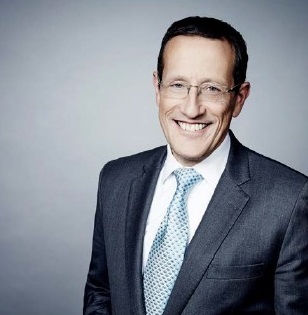
Interview with CNN’s Richard Quest
Foremost international business broadcaster Richard Quest is one of the best-known faces of the CNN team. Quest, who moderated the 22nd UNWTO General Assembly’s high-level debate on tourism and the SDGs, shares his views on the prospects of the sector.
Q – You have been reporting about the tourism sector for the last decade. How do you see the evolution of the sector in the coming years?
A – One has to bear in mind that tourism is one of the fastest-growing sectors in the world; its percentage of GDP is 10% and it represents 1 out of 10 jobs. Its significance is not in doubt. The question is how to grow in a sustainable way. Can the benefits be enjoyed by all or do we end up with a race to the bottom? That is going to be the big challenge: to create a tourism industry that is meaningful, sustainable and profitable.
Q – UNWTO works closely with the media and contributes to enhancing the capacities of journalists to report on tourism. What in your view is the role of the media community in supporting sustainable tourism?
A – The role of the media is not about promoting one view or another. Sustainable tourism is a policy already developed in the context of the United Nations and more precisely in the World Tourism Organization, as part of the SDGs.
Therefore, we have to report about it, about the progress being made and whether it has sense or whether it goes off the rails. I think that one thing that the media can become obsessed with is the question of if we are creating this framework, if the goals are being met, if UNWTO is doing the right thing or the wrong thing…That is not our job. Our job is to report on what is happening, how it is being enforced and how it is being monitored, and to point out the successes and those situations where more work needs to be done. But we are not in the business of promoting somebody else’s agenda. It would be a great mistake for people to believe that this is the role of the media.
Q – One of UNWTO’s areas of work is to support tourism administrations’ communication with the media. What would be your advice to destinations to improve their media relations?
A – You cannot engage with the media only when things are going well. You cannot contact people like me and say “I have a great story for you, come along” or “why do you not come and promote this?” A good story is a good story, but the real relationships are those that are built over a long period of time, where the media grows to understand the good that is happening in your country, the difficulties there and what is being done to solve those.
Tourism ministers who are in a regular dialogue with the media saying “this is what we are doing about sustainable tourism”, “this is what we are doing about terrorism”, “this is what we are doing about security” or “by the way, we have an issue with overcapacity or overbuilding on the seafront, this is what we are doing”… These are the ministers who will have my ear when they have a good story or a challenging story.
So, my advice to any tourism minister or tourism bureau is that media relations cannot be turned on and off. It does not work that way. You will get burnt. Longstanding relations with the media build bridges that both parties cross in the future.
SOURCE: UNWTO Daily, Author unknown.
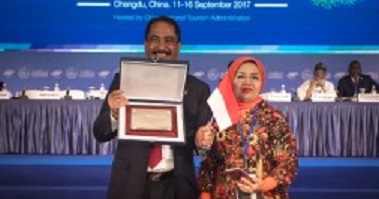
2017 UNWTO Video Competition: And the winners are..
UNWTO unveiled the winners of the 2017 Video Competition at the 22nd General Assembly held in Chengdu, China. Taking the People’s Choice Award was Indonesia.
Regional winners were:
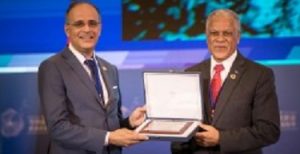
Africa – Tunisia
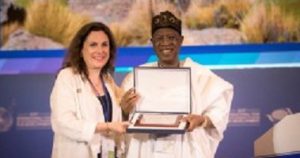
Americas – Chile
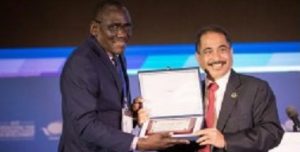
East Asia and the Pacific – Indonesia

Europe – Greece
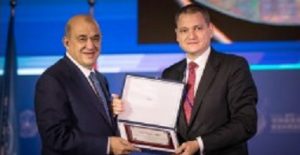
Middle East – Egypt

South Asia – Bhutan
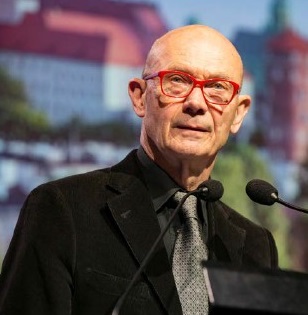
Interview: Chairman of the World Committee on Tourism Ethics
Appointed as Chairman of the World Committee on Tourism Ethics in 2013, Pascal Lamy has been instrumental in the process of presenting the Convention on Tourism Ethics to the 22nd UNWTO General Assembly. Here, he is interviewed at the UN World Tourism Organization (UNWTO) GA meeting in Chengdu, China.
Q. The exponential growth of the tourism sector should translate into higher ethical responsibility. What, in your opinion, are the main challenges that the sector faces in that regard?
A. In the last decades, the number of travelers has multiplied by three and the tourism sector has been growing at a rate of 4% per year. This means that it is necessary to make sure that the 1,235 million tourists travelling today do not become 1,235 problems. Protecting the environment, respecting human rights – particularly those of societies’ most vulnerable groups – and preserving cultural richness and traditions, as well as tangible and intangible heritage, are some of our current challenges. These are also the pillars of the International Year of Sustainable Tourism for Development, pillars that should guide the responsible growth of the sector in the coming decades.
Q. What is the Convention on Tourism Ethics and what impact do you expect it to have in the sector?
A. We presently have a Global Code of Ethics for Tourism, which was adopted in 1999, on how to develop tourism in a responsible and sustainable manner. It is addressed to all stakeholders alike: governments, tourism operators, the hotel sector, tourism workers and travelers. It has been working reasonably well, but we feel that we have to make it stronger. With tourism’s growth we have to take the collective commitment to ethical tourism a step further, via the conversion of the Code into a proper Convention. Probably not all Member States of UNWTO will sign this, but we expect a lot of support. The Code of Ethics is for Member States, operators, industry and consumers. The Convention, being an international, legally-binding treaty, can only be signed and ratified by Member States. Consequently, they are the ones that have to make sure that all actors of their national tourism sectors are responsible and work together to make tourism more ethical. The approval of the Convention, is an ideal achievement of the International Year of Sustainable Tourism for Development that we are celebrating throughout 2017.
Q. What are the key pillars of the Convention on Tourism Ethics?
A. Based on the Global Code of Ethics for Tourism, the Convention has a set of ethical principles that encompass key areas of responsible development, which largely coincide with the UN 2030 Agenda.
• Sustainable development and wildlife, promotion of local culture, waste and energy management, climate change and pollution control);
• Social issues (poverty alleviation, quality of life, protection of children, empowerment of women, accessibility to tourism for all);
• Local community development (local employment opportunities through tourism, local consumption patterns, respect of the rights of indigenous people);
• Improved understanding between cultures (ensuring respect of host societies, transparent tourist information); and
• Labor issues (equal opportunities and nondiscrimination, paid leave, freedom of association, working conditions, career development programs).
Q. How was the text of the Convention prepared?
A. Shortly after the 2015 UNWTO General Assembly, it was decided that the Code of Ethics would have to be converted into an international convention. The UNWTO Secretariat was requested to start preparations to this effect and a Working Group was set up to draft the convention. All UNWTO Member States were invited to be part of the Working Group. As Chairman of the World Committee on Tourism Ethics I participated in all meetings of this Working Group.
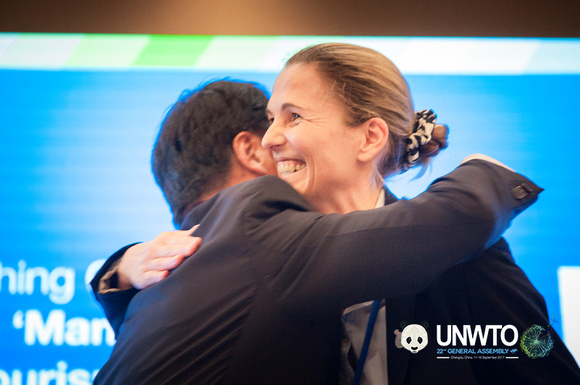
Historic decision:UNWTO Framework Convention on Tourism Ethics approved
The member States of the World Tourism Organization (UNWTO) approved today an historical document – the UNWTO Framework Convention on Tourism Ethics. The Convention, approved at the 22nd UNWTO General Assembly transforms the Code of Ethics for Tourism into an international convention, the first in the life of the Organization.
The Convention covers the responsibilities of all stakeholders in the development sustainable tourism, providing a framework that recommends an ethical and sustainable modus operandi, including the right to tourism, the freedom of movement for tourists and the rights of employees and professionals.
“In an interconnected world where the business volume of tourism equals or even surpasses that of oil exports, food products or automobiles, it is important to set out a legal framework to ensure that growth is dealt with responsibly and that it can be sustained over time. Tourism is a power that must be harnessed for the benefit of all,” said the Chairman of the World Committee on Tourism Ethics (WCTE), Pascal Lamy.
Appointed as Chairman of the WTCE in 2013, Pascal Lamy, together with his colleagues in the Committee, has been instrumental in the process of presenting the Convention on Tourism Ethics to the 22nd UNWTO General Assembly.
The conversion of the Code, which was adopted in 1999, into a proper Convention represents a significant step towards ensuring that tourism development is done with full respect for sustainable development, social issues, local community development, improves understanding between cultures and addresses labour issues.
“This is an historical moment for UNWTO, said the Secretary-General”, Taleb Rifai. “The approval of the Convention is a strong legacy of the International Year of Sustainable Tourism for Development that we celebrate this year. It is also a strong sign that countries are committed to make tourism a force for a better future for all. It reinforces UNWTO institutional outreach in the UN system,” he added.
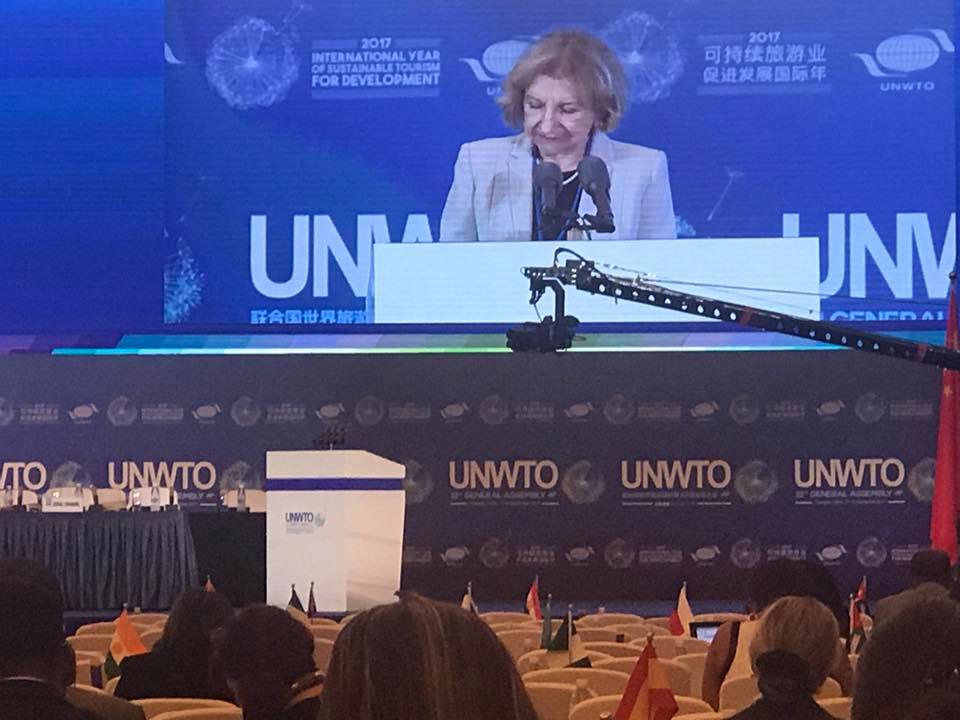
Child Protection & Tourism: Dorothy Rozga, ECPAT speaks at UNWTO General Assembly
At the UNWTO General Assembly in Chengdu, one of the most important issues and problems in the global travel and tourism industry was put in front of delegates and ministers of tourism from 125 countries today.
Addressing UNWTO General Assembly, Dorothy Rozga, Executive Director of ECPAT International, said:
It is a genuine honor to address you on behalf of ECPAT International and the High Level Global Task Force to end the Sexual Exploitation of Children in Travel and Tourism. We are grateful to UNWTO for this opportunity.
I know that the name of the Task Force that I just mentioned casts a negative shadow on the travel and tourism sector. However, I bring a positive and optimistic message. And that message is this: right here, in this hall today, we have the makings of a powerful alliance for the protection of the world’s children. The groundwork has already been laid for the travel and tourism sector to transform into a global leader in child protection.
As we have heard many times over the past few days – the expansion of the travel and tourism sector has multiple economic and social benefits. And many of these carry over to children, bringing positive changes to their lives. Unfortunately, this expansion has also increased opportunities for perpetrators who harm children by sexually exploiting them.
To protect these children, we need to understand this situation within the context of the rapidly evolving state of travel and tourism worldwide.
In response, in 2014, 67 leading organizations and companies from across the world – UN agencies, the private sector, academia, law enforcement and civil society – joined hands in a partnership. And over a two year period, they collectively prepared the Global Study on the Sexual Exploitation of Children in Travel and Tourism. In addition to the global report that summaries almost 3000 pages of research, the Study includes 9 regional reports, 15 country reports and 42 expert papers. It is the largest bank of information ever gathered on this phenomenon.
The Study concluded:
• that the sexual exploitation of children by travelers and tourists has expanded across the globe, out-pacing every attempt to respond;
• that more children are being victimised than ever before; and
• that no country is immune.
We now know there is no typical victim or offender. We know the expansion of internet and mobile technology and the rise of cheap travel means more opportunities to offend. And that means more victims.
To address this situation, the Study makes a series of concrete recommendations for actions to be taken by governments, law enforcement, the private sector, international agencies and civil society. What needs to be done to stop this crime is clear. What is required now is the commitment to act. In particular, Ministries of Tourism need to transform the Study’s recommendations into actions. Child protection needs to be taken into consideration in tourism development plans from the outset.
I’m glad to say that the governments of a number of countries have already convened events or taken steps to implement the recommendations… Ghana, Indonesia, Kenya, Nepal Norway, Poland, Thailand, South Africa, Zambia and Zimbabwe to name a few. In Latin America, the Ministries of Tourism that make up the Regional Group – GARA that is currently chaired by Uruguay are doing outstanding work. And currently a regional plan is being developed by the South Asia Initiative to End Violence against Children (SAIEVAC)for the SAARC countries. Looking ahead, the Government of Colombia has expressed interest in hosting, in 2018, an International Summit on child protection in the travel and tourism sector.
Notwithstanding this progress, much needs to be done. There are children in every country. Travel and tourism reaches every country. Thus actions are required in every country.
Ladies and Gentlemen, during the course of this Assembly, much has been said about the Sustainable Development Goals. As has been observed, it is difficult to find an SDG target that would not, in some way, benefit from the positive energy and support of the travel and tourism sector. This includes the three SDG targets that specifically call for an end to child sexual exploitation.
We need to more clearly recognise and understand the links between the three SDG targets the call for sustainable development of tourism and the three SDGs targets related to child protection. They are mutually reinforcing.
If governments and industry gets the protection of children right, we will no longer have to worry, or feel ashamed, or try to quickly change the subject when this issue is raised. We will be rid of this scourge…..and even the poorest and most vulnerable families will be enjoy the opportunities presented by tourism without fear – and we all live up to UNWTO’s motto – “Travel, enjoy, respect.”
Thank you for your kind attention
Special appreciation is extended to the Dr. Taleb Rifai for his courage to allow this difficult subject to be presented to the General Assembly.

Smart tourism trends tackled at UNWTO General Assembly
The ‘smart’ concept has reached almost everything around us: phones, watches, cars… and also destinations. Smart tourism has taken center stage at the 22nd session of the World Tourism Organization (UNWTO) General Assembly, currently taking place in Chengdu, China. The GA Special Session on Smart Tourism builds on the 1st UNWTO World Conference on Smart Destinations held in Spain earlier this year.
Transport, accommodation, travel reservations and even knowledge are impacted by the ‘smart tourism’ approach. This comprises a whole philosophy leading to more liveable, accessible and sustainable destinations, not only for visitors but also for locals. This model is of great significance and relevance in 2017, when the International Year of Sustainable Tourism for Development is being celebrated widely.
In a General Assembly special session by CNN International anchor Richard Quest interviewed the CEO of TripAdvisor Steve Kaufer “Smart tourism is not a trend, but is the future of tourism development,” said UNWTO Secretary-General Taleb Rifai. “The International Year of Sustainable Tourism for Development 2017 and the General Assembly together comprise the perfect framework within which to conduct such an event and to join synergies around this theme, as it addresses major challenges and opportunities of the tourism sector in the coming years,” he commented.
New platform tourism services or the so-called sharing economy, big data, destination marketing, accessibility, energy and waste management, and urban mobility were some of the topics addressed at the session in Chengdu.
The session was opened by interventions from Rifai, Chairman of the China National Tourism Administration Li Jinzao, and Sara Mathews, Chairperson of PATA. Participants at the event called for increased participation of all involved parties, including private sector and government, to induce progress in creating smart destinations. Two panels on new technologies and smart tourism.
The conference included the signing ceremony of the International Smart Tourism Center by the Talal Abu-Ghazaleh Organization (TAG-Org) and two panels – on new technologies to enhance tourism sector performance, moderated by Anita Mendiratta, Strategic Advisor to CNN International for T.A.S.K Group, and on smart destinations, led by Antonio López de Ávila, Special Advisor of the UNWTO Secretary General on Tourism and Technology. The first panel provided essential background knowledge about the latest wave of digital technologies and applications and their impact on tourism. Research on new platform tourism services was presented by John Kester, Director of the UNWTO Statistics and Trends Program. The panel included Arief Yahya, Minister of Tourism of Indonesia, Mikael Ahlstöm, CEO and Founder of Britny, Kaye Chon, Dean and Chair Professor of the Hong Kong Polytechnic University, Shaohua Li, CEO of AliTrip, Jason Song, Chairman of Drore Technology and Duncan Horton, CEO of Travel Weekly.
The second panel served to present initiatives to demonstrate the impact of digital applications on enhancing quality of the visitor experience. Mapping applications, virtual reality and the future of the so-called sharing economy in tourism were debated in the panel, which contained: David Scowsill, CEO of EON Reality, Sérgio Guerreiro, Director of Knowledge Management and Corporate Affairs of Turismo de Portugal, Hong Wang, Deputy Mayor of Hangzhou, Changje Yu, Committee Member of Tiantai Town, Carlos Romero, Director of Tourism Research at SEGITTUR and Jeremy Jauncey, Founder and CEO of Beautiful Destinations.

12 months to define the future of the tourism sector
Since the designation in 2015 by the United Nations General Assembly of 2017 as the International Year of Sustainable Tourism for Development (IYSTD), a lot has happened. Governments have supported measures to advance sustainability policies, the private sector has progressively engaged in the cause, and travelers have been called upon to be more aware of their contribution to sustainability through the UNWTO ‘Travel.Enjoy.Respect’ Campaign.
More than 1000 participants attended the launch of the IYSTD early in 2017. FITUR, the International Tourism Fair held annually in Madrid, Spain, hosted the presentation of this major celebration. Months later, more than 650 initiatives celebrating the IYSTD have been shared in the online tourism4development.org platform alongside solutions for sustainable tourism. In the last months, UNWTO has designed 10 Special Ambassadors for the IYSTD who have joined the celebrations promoting the Year around the world, scheduled 14 global events and gathered the support of 61 partners.
“We have come upon a unique opportunity to advance sustainable tourism worldwide; the commitment of all parties – governments, civil society and private sector – is essential to capitalizing on this historic moment and building a more responsible sector in the years to come. The International Year will not end in December 2017,” said UNWTO Secretary-General Taleb Rifai.
One of the points addressed in the event held at the UNWTO General Assembly has been the legacy of the International Year. The awareness reached, the commitment achieved and the engagement attained in the last months were underlined as key assets to capitalize on the IYSTD in future years.

UNWTO launches report on New Platform Tourism Services
Understand, rethink and adapt – a UNWTO Report on New Platform Tourism Services was presented at the UNWTO General Assembly in Chengdu, China. New platform services, or the so-called sharing economy, remain one of the game changers for the tourism sector. The topic was discussed at the UNWTO General Assembly’s special session on smart tourism, where UNWTO presented its latest report ‘New Platform Tourism Services (or the so-called Sharing Economy) – Understand, rethink and adapt’. The report recommends ‘to find creative solutions to safeguard consumer rights and quality standards while ensuring fair competition for all businesses.’
While tourism continues to grow strongly, a shift in business models and consumer behavior has been noticeable over the last years. The combination of the global economic crisis, advances in technology and the emergence of digital platforms has resulted in the rise of new platform tourism services, often referred to as the sharing economy.
The report aims at providing useful insight on the new platform tourism services and at contributing to the ongoing discussion and collaboration around them among stakeholders. The publication looks into new platform tourism services across destinations worldwide in five main areas – information, accommodation, transport, food and ‘things to do’ or tourism activities. The study aims to gain a better understanding of how this phenomenon is shaping the tourism sector, to identify the specific opportunities and challenges it poses, and to assess possible actions moving forward.
Findings and recommendations
The report is based on a survey, among UNWTO Member States, Affiliate Members and a selection of 250 destinations, on the importance and impact of the new tourism services. A total of 114 responses were received from organizations across all world regions and three key conclusions emerged:
- New platform tourism services are important and are expected to continue growing in importance in the coming decade. Of the five areas identified in new platform tourism services (information, accommodation, transport, food and other tourism activities), information and accommodation appear to be the most relevant today, followed by transport services. Food and other tourism activities remain somewhat behind in terms of current importance.
- The positive impact of new platform tourism services outweighs their negative effects according to the participants of the survey.
- Opportunities generated should not distract from the pressing need to address the economic, social or environmental challenges created by the new platform tourism services. Doing so requires a comprehensive approach encompassing four key governance areas: (i) planning and sustainability; (ii) fair competition; (iii) consumer protection; and (iv) labor conditions.
As stated by UNWTO Secretary-General Taleb Rifai in the introduction of the report, “we have identified three main directions in the way forward: understanding and monitoring the new platform tourism services, rethinking regulation and addressing the interests of all stakeholders involved – tourists, workers, providers, platforms, competitors, and local communities – and, finally, adapting to the market challenges based on a ‘4C’ approach – communication, collaboration, cooperation and coordination.”
